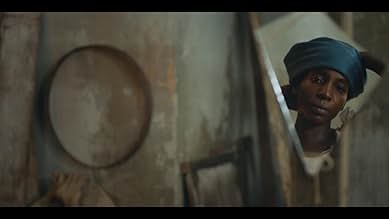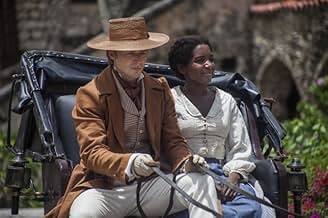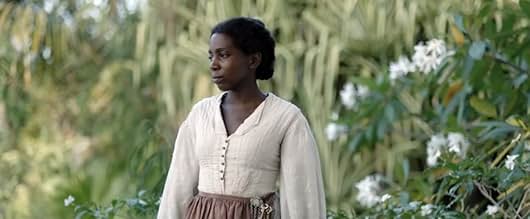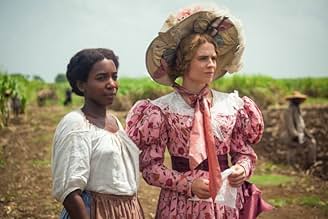Period dramas are extremely common in the UK. There are gritty adaptations to more romanticize tales. The Long Song's is told from a slave's perspective. And the series succeeds on this point. Most audiences, even a British one, are more aware of America's experience of abolishing slavery. The Long Song shows what happens in the Caribbean - it was a time where slaves were rebelling more frequently, making it more dangerous for slave owners.
The series shows that slavery ended for two reasons in the British Empire. The slaves were rebelling and becoming harder to control.There was also a moral campaign in Britain to abolish slavery. The wit that goes along with the heroine's hardships makes this a surprisingly funny but dark look at the end of slavery in Jamaica.
Miss July (Tamara Lawrance) has known nothing except life on a sugar plantation in Jamaica. Taken from her mother at seven years old because Caroline (Hayley Atwell) took a fancy to her as a house slave, July fetches and carries for her mistress, endures her frequent temper tantrums. Tamara Lawrance is wonderful as Miss July.
Despite the heavy subject matter The Long Song was also fairly humorous. Most of this was concentration on Hayley Atwell's character. Caroline is shown to be spoiled and child-like who becomes irate when she doesn't get her way. The character was similar to Queen Anne in The Favourite - a mentally unstable woman in a position of power. The humor helps prevents the series from being too heavy.
The series had cinematic quality even though it was set in the confines of the plantation. The show was shot on location and like any costume drama the production values were of the highest order. There were great looking costumes, scenery, and cinematography. The slave rebellion and Richard's war with the workers added to cinematic quality because of the scale of the scenes and chaos that was happening.
The Long Song was an excellent mini-series that looked at a fascinating period of history and gives audiences an alternative perspective.

![Watch Trailer [OV]](https://m.media-amazon.com/images/M/MV5BZjhlYTE4MTItM2NiMS00NjU0LWJmYTEtZGM5ODI5ODZiZWYxXkEyXkFqcGdeQXRodW1ibmFpbC1pbml0aWFsaXplcg@@._V1_QL75_UX500_CR0)




















